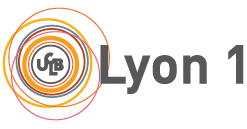Contact: Emilie BOURDONNAY – Christine DELPRAT
e-mail: emilie.bourdonnay@inserm.fr – christine.delprat@univ-lyon1.fr
Keywords: vaccine history, safety, pharmacovigilance, vaccine access, infoveillance, infodemiology
Course content:
The teaching unit is a MOOC 100% online teaching unit, open from October to June. Vaccinology is the science for vaccine development & use with major safety and public health concerns.
During epidemic or pandemic, we observe a rapid and far-reaching spread of (mis)information. Infoveillance (or surveillance of information) refers to public health concerns to analyse online behaviours by collecting, investigating, and visualising data from various sources on the Internet in real time during epidemic or pandemic.
Infodemiology (or epidemiology of information) is the science that manages infoveillance, actions of communication and their impacts to instruct public with global health challenges and induce good protective behaviours.
Using the knowledge of the students in immunology and infectiology, vaccine calendar, oral and written communication, this unit is developing the ability to grasp the context of a vaccine-preventable disease to make decision for communication and public health management.
Modules A-E to train decision-makers in vaccinology while modules F-G will introduce learners to the new multidisciplinary science called “infodemiology”:
A) Cracking the vaccine's code, lessons from the past
B) Vaccine efficacy and safety
C) Overview of global vaccine access
D) Vaccines for whom: children, pregnant women, travelers and seniors
E) Perception, monitoring and impact of immunisation on Public Health
F) Introduction to infodemiology
G) Infodemiology history, evolution & practice at UNICEF
In-person and video co-modal conferences on infoveillance and Infodemiology, partnership with WHO.
Speakers: Teaching Staff, from UFR Biosciences, University Claude Bernard Lyon 1. Conferences concerning new concepts about Infodemiology and Infoveillance will be organised. Speakers will be invited based on their excellence.












